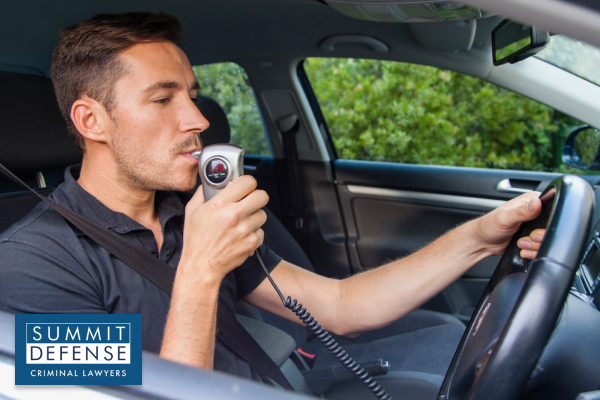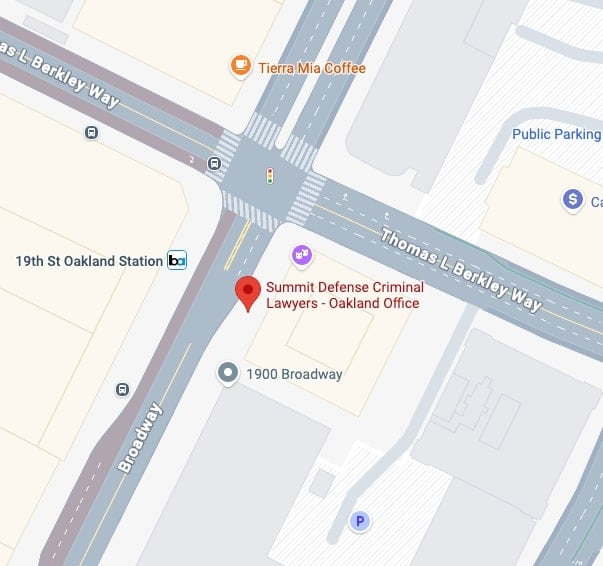When Does a DUI Become a Felony in California?
In California, most DUI charges are misdemeanors, but some situations can make a DUI a more serious felony. If you’re facing charges, it’s important to know what these situations are.
A DUI becomes a felony for a few reasons:
- If you’ve had several DUI convictions.
- If someone gets seriously hurt or dies.
- If you’ve had a felony DUI before.
These cases can have severe consequences, such as long prison sentences, heavy fines, and long-lasting effects.
If you’re facing a felony DUI charge, team up with a skilled Oakland DUI lawyer. They need to have a deep understanding of the ins and outs of California’s DUI laws to handle your case effectively. At Summit Defense, we’re here to help you walk through the legal process and fight for the best possible outcome.
Multiple DUI Convictions (Fourth Offense or More)
If you’ve been convicted of three or more DUIs within 10 years, a fourth DUI arrest will likely be charged as a felony. Under California Vehicle Code Section 23550, a fourth DUI offense carries serious consequences. You could face up to three years in state prison and fines as high as $1,000.
Your driver’s license may be suspended for up to four years, and you may also be required to complete a DUI school program and install an ignition interlock device in your vehicle.
The stakes are high in multiple DUI offenses, which is why it is critical to have a seasoned Oakland DUI lawyer. At Summit Defense, we know how to challenge the prosecution’s case and work to reduce or dismiss charges whenever possible.
DUI Resulting in Serious Injury or Death
A DUI that causes great bodily injury or death is automatically charged as a felony under California Vehicle Code Section 23153. These cases are taken very seriously, and the consequences can be severe.
For instance, if someone is injured, you could face up to four years in prison. If there’s a fatality, the prison sentence could rise to 10 years. On top of that, you may have to pay hefty fines and deal with a long-term license suspension.
If you’re facing charges for a DUI involving injury or death, you need a skilled Oakland felony DUI attorney to protect your rights. Our team will carefully examine every detail of your case. We’ll question the evidence against you and create a solid defense strategy. Our goal is to reduce the consequences and protect your life as much as possible.
Prior Felony DUI Convictions
If you have previously been convicted of a felony DUI, any future arrest for driving under the influence (DUI) will most likely be treated as a felony offense. Repeated offenses come with much harsher penalties.
You could face longer jail time, higher fines, and tougher restrictions on your driver’s license. For example, a second felony DUI conviction can result in up to four years in prison and a five-year suspended driver’s license.
At Summit Defense, we understand how to handle cases involving prior felony DUI convictions. We’ll work tirelessly to challenge the charges and protect your future.
Steps To Take If Charged With a Felony DUI
 Being charged with a felony DUI in Oakland, CA, can be incredibly daunting, but understanding the proper actions to take can greatly affect the outcome of your case. What you do right after your arrest can affect the result of your case. Because of this, proceed with caution and get advice from a professional.
Being charged with a felony DUI in Oakland, CA, can be incredibly daunting, but understanding the proper actions to take can greatly affect the outcome of your case. What you do right after your arrest can affect the result of your case. Because of this, proceed with caution and get advice from a professional.
- Remain silent: It's best to refrain from speaking to law enforcement without having a lawyer by your side. Anything you say can be used against you in court.
- Contact an attorney: Contact an experienced Oakland DUI lawyer immediately. At Summit Defense, we specialize in defending California DUI charges, including felony offenses and drunk driving cases.
- Avoid self-incrimination: Do not share details about your case with anyone except your lawyer, and do not post about it on social media platforms.
- Address license suspension: If your driver’s license is suspended, we can help you request a restricted license or challenge the suspension at your DMV hearing.
- Build a strong defense: Trust your legal team to protect your future. Whether it’s a first-time DUI offense or a second DUI offense, we’ll fight for the best possible outcome.
- Act quickly: Don’t wait to seek help. Contact our Oakland DUI attorney today to start building your defense.
By following these measures, you can safeguard your rights and maximize the likelihood of achieving a positive result. At Summit Defense, we’re here to guide you through every step of the process.
Challenges We Must Overcome When Defending Your Case
Defending a felony DUI case presents unique challenges, but Summit Defense is prepared to tackle them head-on. Each case is different, and understanding the potential obstacles is key to building a strong defense strategy.
- Challenging BAC results: Breathalyzer and blood tests can produce unreliable results due to improper calibration or handling. We know how to challenge this evidence.
- Discrediting witness testimony: Witnesses may provide inconsistent or biased statements. We investigate their credibility and work to discredit unreliable testimony.
- Identifying procedural errors: Unlawful traffic stops or failure to read your Miranda rights can be grounds for dismissing evidence or the entire case.
- Handling complex cases: If your DUI arrest involved marijuana DUI, domestic violence, or other complicating factors, we’ll tailor our strategy to address these issues.
- Minimizing penalties: Our goal is to reduce the risk of jail time, license suspension, and other severe consequences.
These challenges require a skilled and competent legal team. At Summit Defense, we have the knowledge and resources to address these issues effectively and fight for your rights.
At Summit Defense, we understand the stakes of a felony DUI charge. Let our Oakland DUI lawyers put their expertise to work for you. We’ll fight to protect your rights and achieve the best possible outcome for your case.
Penalties for a Felony DUI in California
Understanding the potential penalties for a felony DUI conviction in California is critical. Consequences go beyond fines and jail time, impacting your personal and professional life. Factors like prior convictions, blood alcohol concentration (BAC), and injuries influence the severity of penalties.
At our criminal defense law firm, we’ve seen how these penalties affect clients. Whether it’s a pending DUI case, first-time DUI offenses, or charges like wet reckless, our experienced DUI attorneys traverse California law to protect your rights. From mandatory alcohol treatment programs to restrictions on operating motor vehicles, the stakes are high. Let’s examine the specific penalties you might face if convicted.
Lengthy Prison Sentences and Heavy Fines
A conviction for felony DUI usually results in a state prison term of 16 months to four years. If your case involves great bodily injury to another person, you could face an additional three to six years in state prison. The court may also impose fines up to $5,000, plus penalty assessments that can substantially multiply the total amount.
The existence of aggravating circumstances, like excessively high blood alcohol concentrations or transporting a minor, can result in considerably harsher sentences. Our legal team works to identify mitigating factors that could help reduce these penalties.
Loss of Driving Privileges and Mandatory DUI Programs
A felony DUI conviction results in a driver's license suspension that can last four years or more. Once you qualify for a restricted license, the California DMV might mandate the installation of an ignition interlock device in your car. Additionally, you’ll be required to finish DUI programs, which typically last between 18 and 30 months.
Without driving privileges, getting to work or handling family responsibilities becomes much more challenging. We can help you understand your options for obtaining a restricted license and guide you through the requirements for reinstating your driving privileges.
Impact on Employment and Future Opportunities
A felony DUI conviction creates major barriers to employment, housing, and educational opportunities. Numerous employers perform background screenings, and having a felony on your record can be a problem with your professional certifications or security clearances. The conviction remains on your criminal record unless you successfully petition for expungement later.
We understand these long-term consequences and fight to protect your future opportunities. Whenever feasible, we strive to secure reduced charges or explore alternative sentencing solutions that lessen the long-term consequences on your future.
Defenses to Felony DUI Charges
 Our reliable DUI defense attorneys employ various strategies to challenge felony DUI charges in Oakland courts. We meticulously analyze every aspect of your situation to craft the most robust defense strategy possible. Here are some key strategies we use:
Our reliable DUI defense attorneys employ various strategies to challenge felony DUI charges in Oakland courts. We meticulously analyze every aspect of your situation to craft the most robust defense strategy possible. Here are some key strategies we use:
 Facing felony DUI charges in Oakland, California, is a serious matter that can change your life. A felony DUI is worse than a misdemeanor and carries tough penalties, such as lengthy jail time, hefty fines, and long-term consequences.
Facing felony DUI charges in Oakland, California, is a serious matter that can change your life. A felony DUI is worse than a misdemeanor and carries tough penalties, such as lengthy jail time, hefty fines, and long-term consequences.

 Experience matters when defending
Experience matters when defending  Being charged with a felony DUI in Oakland, CA, can be incredibly daunting, but understanding the
Being charged with a felony DUI in Oakland, CA, can be incredibly daunting, but understanding the  Our reliable DUI defense attorneys employ various strategies to challenge felony DUI charges in Oakland courts. We meticulously analyze every aspect of your situation to craft the most robust defense strategy possible. Here are some key strategies we use:
Our reliable DUI defense attorneys employ various strategies to challenge felony DUI charges in Oakland courts. We meticulously analyze every aspect of your situation to craft the most robust defense strategy possible. Here are some key strategies we use: If you're facing felony DUI charges in Oakland or anywhere in Alameda County, don't wait to seek legal help. Our proficient criminal defense attorneys are ready to evaluate your case and explain your options. We offer free consultations and can start working on your defense immediately.
If you're facing felony DUI charges in Oakland or anywhere in Alameda County, don't wait to seek legal help. Our proficient criminal defense attorneys are ready to evaluate your case and explain your options. We offer free consultations and can start working on your defense immediately.









